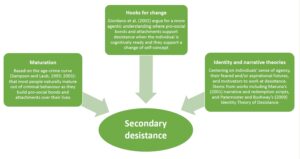Embedding desistance practice
The timing of the Probation Inspectorate’s new thematic inspection on desistance and young people could hardly be better. Published on 24 May 2016, it forms an important context for the review of youth justice being undertaken by Charlie Taylor for Michael Gove.
The report
The inspection sought to assess the effectiveness of practice in YOTs across eight domains which desistance research has highlighted as being significant in supporting children and young people’s journeys away from offending:
- Building professional relationships, effective engagement and re-engagement, evidence of genuine collaborative working;
- Evidence of engagement with wider social contexts, especially the family, but also peers, schools, colleges, work etc.;
- The active management of diversity needs;
- Effectiveness in addressing key ‘structural barriers’ (exclusion from education, training or employment, lack of participation, lack of resources, substance misuse deficits, insufficiency of mental health services etc.);
- Creation of opportunities for change, participation and community integration;
- Motivating children and young people;
- Addressing children and young people’s sense of identity and self-worth;
- Constructive use of restorative approaches.
The inspection was based on interviews with groups of young people — both those who had reoffended and those who had desisted from crime and their parents/carers and key workers in addition to analysis of case records.
Key findings
The report organises its findings into four key categories which are summarised in turn below.
Factors enabling desistance
Young people who had given up crime identified a number of aspects which had helped them move away from offending:
- A balanced, trusting and consistent working relationship with at least one worker. This was not necessarily the assigned case manager but was, in a number of cases, another professional within or, less frequently, outside the YOT;
- Meaningful personal relationships and a sense of belonging to family;
- Emotional support, practical help and where the worker clearly believed in the capacity of the child or young person to desist from offending;
- The development of a strong relationship and/or becoming a parent;
- Changing peer and friendship groups;
- Interventions which provided problem solving solutions to use in day-to-day life situations; and
- Well planned and relevant restorative justice interventions.
Factors hindering desistance
Although the group of young people who had moved away from crime were generally positive about their experiences with YOTs, they did identify less helpful issues they had encountered:
- Formal offending behaviour programmes that did not meet their individual need;
- Poor relationships with case managers;
- Frequent changes of case manager;
- Their identified needs not being addressed;
- A lack of genuine involvement with their case manager in planning for work to reduce reoffending;
- Objectives in plans not being personalised to their assessed needs.
Analysis of case records
The inspectors review of current case records found a mixed picture:
- Some good work being undertaken to support and promote desistance;
- Work to build and sustain effective working relationships with children and young people was generally done well;
- A majority of children and young people were supported to negotiate structural barriers;
- Self-assessment tools, such as the Youth Justice Board’s ‘What Do You Think’, were completed in a majority of cases, but the views of children and young people were reflected in less than one in four plans;
- Although learning styles questionnaires were completed in almost three in ten cases in the sample, they were explicitly referenced in plans or utilised in interventions in only one in four of those cases;
- There had been problems with compliance in a number of cases but barriers to engagement had only been assessed clearly in a minority of cases. Plans to address these barriers to engagement were in place in only one in three relevant cases.
- Many of those children and young people who had received a number of court orders over time were subject to the same or similar interventions, and found them no longer age-appropriate, or disengaging, or repetitive or demotivating.
Interviews with case managers
In interviews with case managers inspectors found:
- A lack of detailed knowledge around desistance theory in general and its application to practice, not helped by the fact that the majority of case managers had received little training on this subject.
- Evidence that case managers often equated desistance with a narrow offence focus or risk-factor approach to practice.
- Case managers sometimes felt pressure from their managers to concentrate on delivering offence focused interventions which they could evidence rather than focus on building relationships with service users.
This last section will be familiar to many youth justice and probation practitioners who share the view that although risk assessment and an evidence-based approach are important, desistance work requires the application of professional skills and empathy, not merely algorithms and tools which are more about caseload profiling than assessing individual need.
Recommendations
Naturally, the Inspectorate publish a set of recommendations aligned with these findings. Perhaps the most important is aimed at the Youth Justice Board, recommending that the YJB should:
review YOT practice guidance to take greater account of desistance theory; including measures to promote genuinely collaborative working with children and young people, and working with key personal, social and community networks.









2 Responses
Glad to say we in YJB Cymru are already working on just such an approach in our trauma-informed Enhanced Case Management approach. This is testing relational working with young people, guided by the latest research on attachment and neurology. In the three test YOTs we’re seeing some very positive early results with the relationships between practitioners and young people being transformed.
Hi Dusty
Thanks very much for the update. Excellent to hear about positive new developments.
We are in sore need of positive practice to guide us going forwards
Best Wishes
Russell